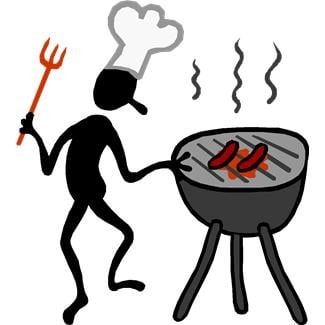“Oops! I Melted My Siding!” and Other Barbequing Mistakes
May 21st, 2013 | 4 min. read
By Jenica Lee
Get weekly updates with the most recent articles and videos from Southwest Exteriors.
Subscribe
Memorial Day is almost here, and a beautiful season of barbequing has already begun in the San Antonio area. My neighbors and I all love to grill, but have you ever noticed how many people have their BBQ grills right next to the house? It provides convenience, but it can also be a pretty serious fire risk.
BBQ grill related fires cause an average of $79 million dollars of damage a year. In fact, between 2003 and 2006, the U.S. Fire Protection Association reported just under 8000 fires that were caused by outdoor grills!
Here are some outdoor cooking rules to live by:

1. Don’t forget the fire extinguisher.
You should always keep one near your grill in case of emergencies
 2. Keep children away from BBQ grills.
2. Keep children away from BBQ grills.
Grills and children can both be unpredictable, so it’s best that they avoid contact all together.

3. Vinyl or wood siding and grills do NOT mix.
Fired-up grills must be placed at least 10 feet away from the house, or vinyl siding will melt (which also releases toxic gases). A close proximity to wood siding could easily lead to the wood catching on fire and burning (since that’s what wood does).

4. Choose a rock or cement surface to put your grill on.
A lot of homeowners prefer to grill on their wooden deck, but since one-third of grill-related fires happen right there, it’s probably not the best place to do that. Also, if a deck or grass catch fire, that will also cause vinyl siding to melt as the heat increases (even from farther away than 10 feet).
5. Never grill in the garage.
Anything that burns releases carbon monoxide, which can be deadly. Garages are also where many flammable and combustible materials are stored, and adding heat to the mix could cause an explosion.
6. Properly maintain your grill by checking for gas leaks.
By pouring water over the connection between the grill and propane tank, you can see if it releases bubbles of gas, signifying a leak.
Can you repair melted vinyl siding?
If your vinyl siding has melted, it cannot be repaired. Vinyl siding is made of PVC (polyvinyl chloride) plastic, which has a low melting point. Heat sources such as grills, fire pits, and reflective surfaces can cause vinyl siding to melt, warp, or distort.
If you have melted vinyl siding, the only solution is to replace the affected panels. If the damage is extensive or affects a large area, you may need to replace all of the siding on that side of your house. It's important to choose a replacement siding panel that matches the color and texture of your existing siding to ensure a seamless repair.
To prevent future melting of your vinyl siding, be sure to keep heat sources away from your house, especially during hot weather or when using a grill or fire pit. If you have reflective surfaces nearby, such as low-e windows or polished metal surfaces, consider using a heat shield or other protective measures to prevent the sun's rays from being reflected onto your siding.
Is melted vinyl siding covered under a manufacturer's warranty?
No, melted vinyl siding is not typically covered under warranty. Most vinyl siding manufacturers' warranties specifically exclude damage caused by excessive heat, including melting, warping, or distortion of the siding. This is because vinyl siding is not designed to withstand high temperatures and can easily melt or warp when exposed to heat sources such as grills, fire pits, or reflective surfaces.
However, it's always a good idea to check the specific terms of your vinyl siding warranty to see if there are any provisions related to heat damage. Some warranties may offer limited coverage for certain types of heat damage, such as damage caused by normal exposure to sunlight or by non-reflective heat sources.
If your vinyl siding has melted due to an external heat source, your best option is to replace the affected panels. Check with your siding manufacturer or a professional siding contractor to find replacement panels that match the color and texture of your existing siding. It's also a good idea to take steps to prevent future heat damage by keeping heat sources away from your house and using protective measures if necessary.
In closing
For the avid barbecue griller, we highly recommend choosing a type of siding that won’t melt or burn. If you have HardiePlank siding, your home is much more resistant to heat and fire. It is made from 90% sand and cement, so it is not flammable. If you’d like to see what happens to vinyl, wood, and HardiePlank siding in the presence of fire, check out this video.
http://youtu.be/7Ti5faqnvUQ
Of course, no matter what kind of siding you have, it is always wise to follow fire safety rules. Happy (and safe) grilling!
